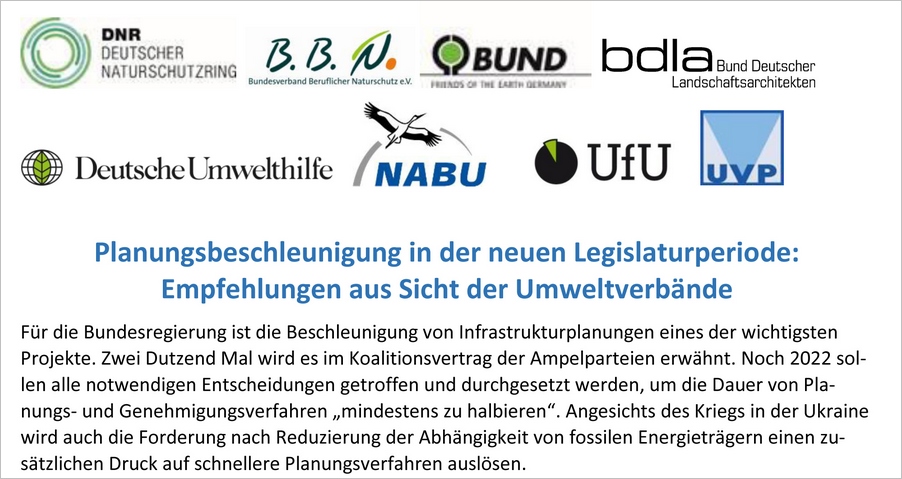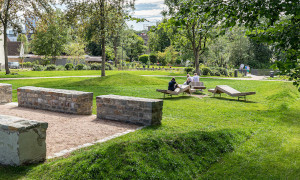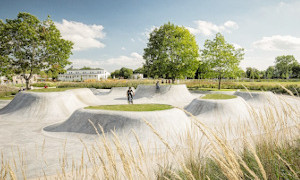Improved planning and participation instead of symbolic politics at the expense of the environment
The environmental organizations BBN, bdla, BUND, NABU, DUH, UfU, UVP-Gesellschaft and the environmental umbrella organization DNR have presented concrete recommendations for action to effectively accelerate infrastructure projects in the current legislative period. On the occasion of a parliamentary discussion with members of the German Bundestag, they emphasize that there is an urgent need for acceleration in the area of climate and environmental protection measures while maintaining established participation and environmental standards in order to achieve the goal of climate neutrality.

"What is needed, therefore, is a strict prioritization of projects according to their climate and environmental benefits, instead of planning hundreds of often climate-damaging projects, such as in transport infrastructure," the associations said in their assessment.
Potential for acceleration could be leveraged above all by avoiding potential conflicts between climate protection and species conservation as far as possible - including through overarching solutions - or by identifying them at an early stage and bringing them to a solution with the participation of the public.
Landscape architects play a central role in the technical underpinning of the process at all planning levels and its participatory control. Adequate fees are a basic condition to be able to prepare qualified documents and to bind the necessary personnel. A significant increase and dynamization of the fees for area planning in the course of the amendment of the HOAI is therefore an indispensable prerequisite for the desired acceleration of planning.
Kerstin Berg, bdla-Speaker Landscape Planning, Bielfeldt Berg Landdschaftsplanung, Hamburg
It is also important to make better use of the current legal framework and to implement the numerous acceleration laws and evaluate them with regard to their benefits for planning quality and acceleration. This should be done before new and extensive legislative changes are adopted. "The decisive factor is the consistent application of measures that have already been adopted," the environmental organizations added.
Measures adopted in the last legislative period, such as the use of project managers, the use of application conferences, the establishment of early public participation and planning simplifications for smaller projects, are still waiting to be implemented. The focus of future acceleration measures should therefore be on improving enforcement and strengthening sub-legislative measures.
A prerequisite for improved planning that accelerates approval procedures is - in addition to the necessary capacities in the approval authorities and the nature conservation administrations - the personnel capacities in the independent offices and comparable institutions that usually prepare the documents. Demogaphic change and the intended expansion of planning capacities in the public administration will inevitably increase the labor shortage in the offices.
Kerstin mountain, bdla Fachsprecherin landscape planning, Bielfeldt mountain landscape planning, Hamburg
The associations are convinced that the coalition agreement of the federal government contains some measures that are highly controversial in terms of European law and the rule of law. In addition, some plans will provoke protracted legal disputes about their permissibility. This applies in particular to the reintroduction of substantive preclusion, the introduction of a duty to cooperate for environmental associations, the abolition of suspensive effect in legal protection proceedings or the introduction of fictitious approvals, which lead to considerable legal uncertainties.
"Planning acceleration is not an end in itself. It must effectively advance societal transformation and promote its acceptance, protect the climate and ensure the protection of biodiversity," was the associations' concluding appeal to policymakers.
The associations' recommendations for action, on which bdla worked intensively, are
pdf
available here
(615 KB)
.
Federation of German landscape architects bdla
Wilhelmine-Gemberg-Weg 6, 10179 Berlin
Tel. 030 27 87 15-0, Fax 030 27 87 15-55
- Latitude: 0
- Longitude: 0


